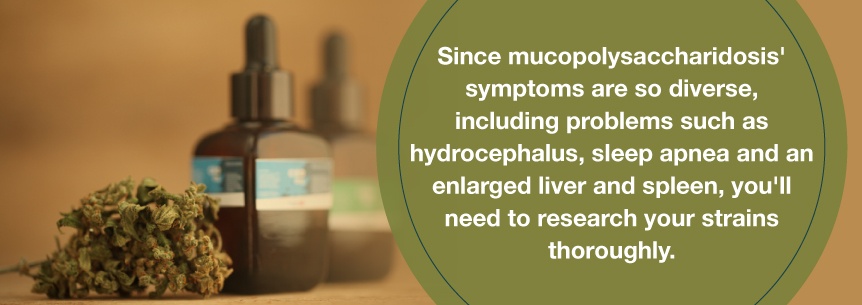
Nobody wants to receive a diagnosis of a severe health condition, especially mucopolysaccharidosis, which can cause a whole range of symptoms and other problems, along with having limited treatment options. However, as an alternative treatment, cannabis for mucopolysaccharidosis packs quite a punch with its ability to alleviate many diverse symptoms, including those of mucopolysaccharidosis.
Mucopolysaccharidosis (MPS) is a group of inherited disorders where your body can’t properly break down chains of sugar molecules called mucopolysaccharides. Because of this, these sugars begin building up in blood, cells and connective tissue, leading to various health problems.
The treatment you receive will depend on the symptoms you’re experiencing.
There are seven different types and several subtypes of MPS.
Depending on symptom severity, health professionals separate MPS I into three main clinical entities:
1. Hurler syndrome (MPS 1-H) is the most severe type of MPS. It’s a progressive condition with multiple organ and tissue involvement that leads to early childhood death.
2. Scheie syndrome (MPS 1-S) is the mildest type of MPS. Symptoms typically appear after the child turns 5, and they often receive a diagnosis after they turn 10.
3. Hurler-Scheie syndrome (MPS 1H/S) describes an intermediate clinical phenotype — for example when the presentation of the disorder doesn’t fit either the more severe or the milder category.
An alpha-L-iduronidase deficiency causes all these, and distinguishing between them depends on clinical criteria, which include the symptom’s rate of progression.
Hunter syndrome, or MPS 2, is the only MPS with X-linked inheritance. So, it occurs exclusively in boys, with an incidence rate of 1.3 per 100,000 live male births.
Sanfilippo syndrome, or MPS 3, comes with four subtypes (A through D) differentiated by four separate enzyme deficiencies involved in heparan sulfate degradation. Severe central nervous system disease that leads to progressive neurocognitive deterioration characterizes the condition.
Morquio syndrome, or MPS 4, occurs due to defective degradation of any of the structural carbohydrates in the cartilage, cornea, and bone due to a deficiency in beta-galactosidase, a powerful tool for genetic engineering of bacteria, and an enzyme called N-acetyl-galactosamine-6-sulfatase.
Maroteaux-Lamy syndrome, or MPS 6, is the result of a deficiency in an enzyme called arylsulfatase B, leading to the accumulation of dermatan sulfate, a glycosaminoglycan found mostly in the skin.
Sly syndrome, or MPS 7, results from a beta-glucuronidase deficiency, leading to a lack of dermatan sulfate, heparan sulfate and chondroitin sulfate — a chemical normally present in cartilage around joints in the body.
Hyaluronidase deficiency, or MPS 9, is an extremely rare type of MPS marked by a deficiency in the hyaluronidase enzyme, which is responsible for breaking down hyaluronic acid.
The symptoms of MPS aren’t present at birth, but begin appearing during childhood. Individuals whose MPS is severe develop this condition’s features earlier than individuals with attenuated MPS.

The symptoms you experience will depend on the type of MPS you have. For instance, the symptoms and signs of MPS I occur due to the alpha-L-iduronidase enzyme deficiency, required to metabolize or break down complex carbohydrates called mucopolysaccharides.
For instance, some symptoms that could occur in MPS I are:
Associated symptoms and signs and the condition’s severity vary substantially by type. Generally, most people with MPS seem healthy at birth, experiencing a period of regular development, but then start declining in mental or physical function. As MPS progresses, it could affect:
MPS’ underlying genetic cause will vary depending on its form. Many cases of MPS are genetic, and not associated with the sex chromosomes. However, one specific type of MPS — MPS II — follows an inheritance X-linked pattern.
IDUA gene mutations cause MPS I. The IDUA gene gives instructions for an enzyme production that’s involved in breaking down large sugar molecules called glycosaminoglycans, or GAGs. GAGs used to be called mucopolysaccharides, which is how the condition received its name. IDUA gene mutations reduce or eliminate the IDUA enzyme function.
GAGs accumulate within cells due to the lack of IDUA enzyme activity, particularly inside the lysosomes. These are compartments in the cell responsible for digesting and recycling various types of molecules. Disorders that cause the buildup of molecules inside the lysosomes, MPS I included, are called lysosomal storage disorders.
The accumulation of GAGs enhances the size of the lysosomes, which explains why a lot of organs and tissues become enlarged in people who have this condition. Researchers believe the GAGs could also interfere with other proteins’ functions inside the lysosomes, disrupting the molecule movement inside the cell.
The condition is genetically transmitted, with both parents contributing one recessive gene that carries precisely the same genetic inheritance type. Human traits which include the classic genetic disorders are the product of the two genes interacting for that condition.
MPS can cause wide-ranging complications, including:
Individuals with MPS might experience:
Impaired cardiopulmonary function among MPS sufferers can cause fatigue, which can produce:
Facts about mucopolysaccharidosis, according to the National Organization for Rare Disorders, include:

Treatment for MPS requires a multidisciplinary team of healthcare professionals because of its wide range of symptoms. This team of doctors could include:
The two main MPS I treatment options are enzyme replacement therapy and hematopoietic stem cell transplant (HSCT). Both of these help replace the missing IDUA enzyme.
Doctors usually prescribe HSCT to patients with severe MPS I. However, the timing of the treatment will determine its success. Many medical professionals recommend providing HSCT early on, before the patient’s second birthday. Research has shown when HSCT is successful, it can improve auditory, facial and cardiac manifestations.
While the treatment has also been successful in slowing down cognitive decline, its effect on intellectual development isn’t as clear, although some research does suggest an improvement.
A medication called aldurazyme or laronidase is the enzyme replacement therapy for the condition. Laronidase treatment helps improve problems associated with:
However, this treatment will not help improve issues with mental development, since the drug can’t cross the brain-blood barrier.
Side effects of these medicines may include:
New insights on the pathophysiology of mucopolysaccharidosis disorders are leading to gene therapy, alternative therapeutic approaches, substrate reduction therapy, and inflammatory response modulators.
Researchers are conducting a study to evaluate the side effects and efficacy of donor hematopoietic cells through the use of a chemotherapy regimen and not total-body irradiation in kids with MPS undergoing a hematopoietic stem cell transplant.
Scientists are also carrying out a study to evaluate the safety and efficacy of the drug JR-141 for MPS II.
Patients with MPS might experience considerable discomfort and pain alongside the condition. Traditionally, doctors have treated pain with opioid narcotics like Percocet and Vicodin, as well as analgesics like acetaminophen or ibuprofen.
While opioids are effective in relieving chronic pain, they come with side effects and highly addictive properties. Analgesics, while not addictive, aren’t that effective in eliminating pain, and can have serious side effects from long-term use like liver damage, stomach bleeding and kidney damage.

Medical marijuana and mucopolysaccharidosis treatment is much safer than opioids. In many cases, medical weed has not only reduced the side effects of opioids and other medicines but has also helped improve patients’ quality of life. Be aware, however, cannabis can come with some side effects like:
Many years’ worth of anecdotal evidence shows marijuana’s efficacy in treating chronic pain conditions. These days, scientific and medical communities are catching up with what cannabis advocates have known for some time now.
A review of 28 studies evaluating cannabinoids for treating pain and other medical issues has the support of quality evidence.
Some of the symptoms of MPS cause nausea in patients. Severe nausea keeps cells from fulfilling their essential functions, including:
Endocannabinoids, the endocannabinoid system’s backbone, consist of a variety of enzymatic pathways forming patterns in the brain. These inform the brain of various functional roles. In individuals with severe nausea, these pathways become disturbed. For a lot of patients, however, CBD products can help get the body back on track.
Pain is often common in mucopolysaccharidosis patients. As mentioned above, medical weed has been proven to help reduce or eliminate pain, helping improve the patient’s quality of life.
Depression and anxiety are also often a problem for many MPS patients. Several strains of medical pot are ideal for helping people restore their mental health.
The symptom of hydrocephalus in MPS can cause nausea and vomiting, headaches, irritability, and sleepiness, all of which medical marijuana for mucopolysaccharidosis can help treat.
Nausea and vomiting is also a symptom of the hepatosplenomegaly symptom in MPS.
Recurrent ear infections are another symptom of MPS and can cause pain, inflammation, nausea, vomiting, and headache. Cannabis can be helpful for all these symptoms.
Spinal stenosis, another MPS symptom, causes pain, cramping, muscle weakness and a pins-and-needles sensation in the legs, back, and buttocks. Medical weed can often alleviate these symptoms.
Medical cannabis for mucopolysaccharidosis offers the benefit of being a consistent, professionally cultivated product. Commercial growers can produce plants more accurately with the proper balance of cannabinoid compounds to help with specific conditions and symptoms.
Since mucopolysaccharidosis’ symptoms are so diverse, including problems such as hydrocephalus, sleep apnea, and an enlarged liver and spleen, you’ll need to research your strains thoroughly.

Some strains treat nausea, headache, and pain, while others help with depression, anxiety, inflammation, and muscle spasms. A knowledgeable cannabis professional at a marijuana dispensary can help you choose the right strains for the symptoms you’re experiencing.
We’ll include some marijuana for mucopolysaccharidosis strains here that will help address the symptoms mentioned above.
There are also many consumption methods to choose from to receive your cannabis treatment. For instance, there are:
These methods allow users to take cannabis orally, such as:
These offer almost immediate results and are where you take your treatment through:
You apply these to your skin, which absorbs the cannabis. These include:
More and more delivery methods are coming out these days, thereby allowing patients freedom of choice in how they wish to receive their treatment. It may come down to trial and error to find the best method for you, but know that when smoking marijuana, you can have adverse respiratory effects, so you may prefer other ways to take your medical cannabis.
Here at MarijuanaDoctors.com, our goal is to keep you informed and updated on the medical cannabis process and ensure you know all your options. Check out our resources section to ensure you know all the things you need to know about medical pot treatment.
Whether you’re looking for information on different strains or different consumption methods, we’re here to help. Sign up for our newsletter to stay current. Search our database for a reputable, licensed marijuana doctor and dispensary near you.
Find A Doctor Find A Dispensary